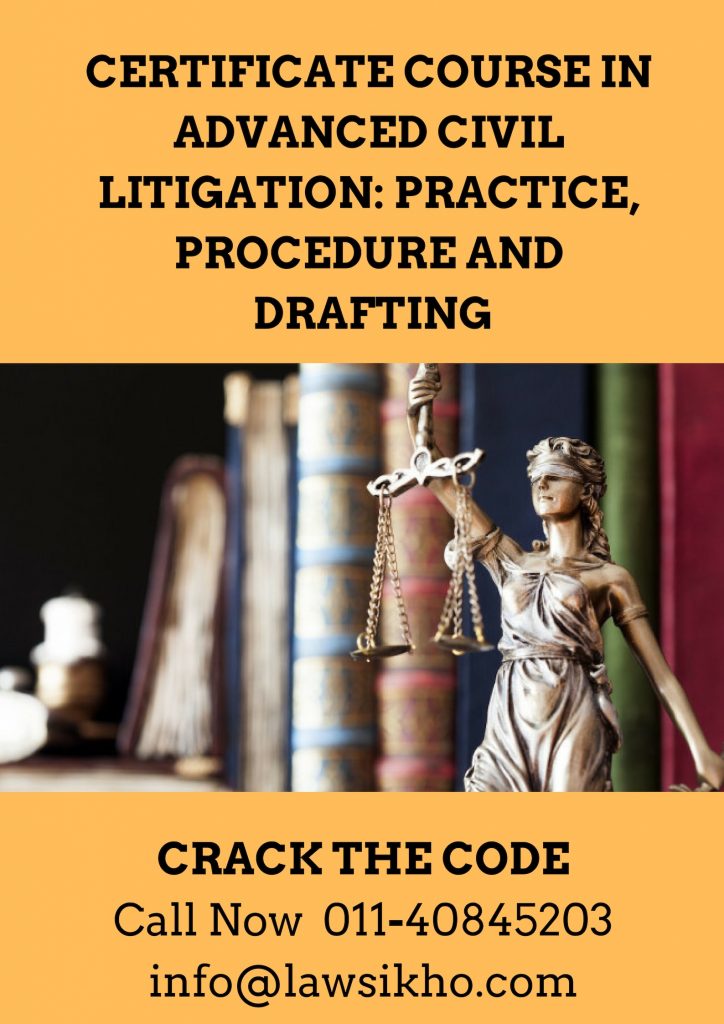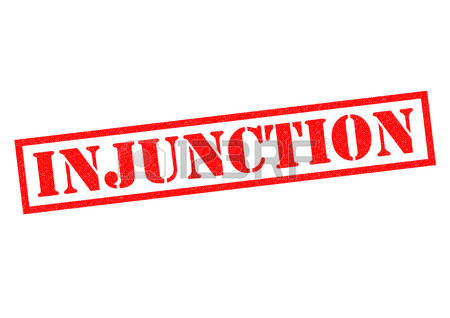This Article is written by Parshav Gandhi, a 3rd-year student, Indore Institute of Law. This article mainly discusses about how the order of injunction can be used as a remedy in tort.

Introduction to Tort
A tort is an act of a person which result in civil wrong to another person.
Tort law is the law which protects people from wrongful acts of others. If a person’s civil right gets damaged by someone else’s wrongful act, that person can bring a claim for remedies against the person who commits the tort. The purpose of tort law is to ensure that every innocent person against whom the act of tort is done gets rightful remedy against that act.
Any law without remedy is a pointless exercise.
Remedies under Tort
Judicial Remedies
Those remedies which are provided by the court in the suit filed by the injured party comes under Judicial Remedies. Following are the types of judicial remedies:
Damages
It means the money compensation claimed by the injured party.
Bhim Singh V. State of J&K
In this case, Bhim Singh was a member of the legislative assembly. Defendant prevents him from attending the session in result he was suspended from the assembly. He files the suit. He gets Rs. 50000 as a compensation i.e. as damages for the injury.
Injunction
An injunction means the order of the court restricting the person from doing, continuing or repeating a wrongful act.
Illustration
A enters B’s land regularly without his consent. B can approach the court and ask for the order of injunction against A i.e. to restrict A from entering B’s land again.
Specific Restitution of property
When a person wrongfully possessed the property of another person, another person is entitled to recover his property.
Illustration
Ram takes motorcycle of Dev without his consent. So, Dev is entitled to recover his property from Ram.
Extra-judicial Remedies
These are those remedies which are open to all the person i.e. the person takes the law in his own hand. Remedies like self-defence, Re-caption, Expulsion of trespasser etc.
Illustration
If C tries to take the movable property from W’s possession, W can use self-defence against C i.e. W can use the extra-judicial remedy.
Jagtar Singh v. State of Punjab
In this case, the accused was convicted of the offence of murder. The accused files for defence as he states that he fired in self-defence only . he doesn’t have any other intentions. The Supreme Court accepted his appeal and stated that the act was done by the accused in under the self-defence and him only liable under the Act.
Injunction as a remedy in law of Tort
An injunction is the type of remedy in which the court provides special orders that compel the other party to do or abstain from doing some specific act.
Generally, people ask for the monetary compensation(damages) for the injury they have suffered but, in many cases, the plaintiff asks for the remedy of an Injunction to prevent the occurrence of the harm in the future.
Meaning and scope of injunctions
An injunction is an order of the court against a person, which ceases him from doing or not doing any particular act. The court has the discretion to provide injunctive relief or not.
Illustration
News channel named APK news takes the interview of Mr.Kabani. Next day, runs news that Mr Kabani and Mrs Chandali has an affair going on. Mr Kabani doesn’t know about it. The news affects Mr Kabani’s reputation and he files a case of defamation against the news channel and also demands the injunction i.e. the order of the court against the news channel asking news channel to stop repeating the news regularly on their channel. Now the discretion to provide injunction or not is completely based on the court.
And if court passes the order of any person but if that person fails to comply with the court orders then he is liable for the contempt of court.
Classification of Injunction
Injunctions are classified into two categories:
Based on the time period
(a) Temporary Injunction
(b) Permanent Injunction
Based on the nature of the order
(a) Prohibitory Injunction
(b) Mandatory injunction
(c) The Mareva Injunction
Based on Time Period
Temporary Injunction
Temporary Injunction means the order of injunction by the court for a specified time i.e., until the next order of the court. Basically, a temporary injunction is granted in the early stage of any suit.
Illustration
A and B are involved in a dispute related to the possession of a car. If the suit in the court is still running and B regularly commits the tort by entering in the car without the permission. A can ask the court for a temporary injunction against B and restrict him from doing that act again but only up to the day of judgement and after the court gives its judgement both the party will be bound by that judgement.
Rules regarding Temporary Injunction under order 39 of the code of Civil procedure
Cases in which temporary injunction may be granted
Where in the suit it is proved or otherwise
(a) Any property is in dispute and the court thinks that the property is in danger or the property can be damaged or wasted by any of either party or;
(b) The defendant threatens or intends to remove or dispose of the property.
Illustration
Suppose A and B involved in a dispute related to the possession of the house, if the court believes that, there is a danger to the house by any of the party or the defendant of the case threatens that, he will damage the property. The court can pass the order of temporary injunction against that party.
An injunction to restrain the repetition of the same act
The plaintiff to restrain the defendant from committing any further tort, during the course of the suit, or either before or after the judgement, or whether compensation is claimed or not, applies to the court for a temporary injunction to restrain the defendant from committing the same tort again and again.
The court may grant the injunction, on such terms as keeping an account, giving security, or otherwise, as the court thinks fit.

Illustration
If A repeatedly does any act of tort against B, The court can pass an order of injunction to restrain the repetition of the act by A, on such terms as keeping an account, giving security, or otherwise, as the court thinks fit.
The consequence of disobedience or breach of an injunction
If the person disobeys the court order of injunction as per rule 1 or rule 2 i.e. breach any of the term and condition of the injunction is held liable for disobedience of the court order. Such a person, punished with civil imprisonment for not more than 3 months unless the court directs his release orders.
Illustration
If A is continuously doing the act of tort against B. So B approaches the court and asks for the injunctive relief. The court passes the injunction orders against A. If A opposes the order and does the act again then, he becomes liable for the contempt of court.
Before granting an injunction, the court has to direct notice to the opposite party:
The court before passing the order of injunction directs to pass the notice of the same to the opposite party.
The Court in all cases, except in the case where it appears that the object of granting the injunction would be defeated by the delay, before granting an injunction, provide direct notice of the same to the opposite party.
Illustration
If A and B involve in the matter and the court wants to pass an order of injunction against B. So before passing the order, the court has to provide a notice to B regarding the same.
In the case, where it appears that the object of granting the injunction would be defeated by the delay and if the party is able to convince the court to pass the order of injunction without wasting time in providing notice to another party. If the court thinks fit, can pass the injunction order without passing the notice to the other party. The court shall record the reason and require the applicant
(a) To send the opposite party, a registered post immediately after the order of injunction by the court together with-
(i) a copy of the affidavit filed in support of the application;
(ii) a copy of the plaint; and,
(iii) copies of documents on which the applicant relies.
(b) The affidavit that he has delivered the above documents to opposite party within the same day or the next immediate day.
In E.M.I. Limited and others v. Kishorilal N.Pandit
In this case, the plaintiff files for the injunction order, as without giving the notice to the opposite party. As per plaintiff, it will take 8 months to gather the evidence to raise prima facie case that the affidavit contained the false information. The plaintiff argued, it is necessary that the order should be passed against the defendant otherwise any important material still in his possession would be destroyed by him. The court allowed the appeal.
Order for an injunction may be discharged, varied or set aside
Order of injunction can be discharged or set aside, if;
If the application for the temporary injunction has some type of false or misleading statements.
Illustration
If in the dispute related to A and B the court passes the injunction order against B. but if it was discovered that A gives a false statement in the court. In that situation, the court’s injunction order gets discharged or set aside.
When the court passed the injunction order without providing notice to the opposite party.
Illustration
If the court in the dispute between Ram and Shyam pass the order of injunction against Ram without giving him the notice. So the order of injunction by court gets discharged or set aside.
When the application for the temporary injunction without giving notice is passed and if the party after the order of injunction does not send the copy to the opposite party and provide a false affidavit regarding the same in the court of law.
Illustration
If A approach the court and ask for an injunction without providing notice to other party and the court thinks fit and pass the order. If A fails to provide another party, the documents as prescribed by the rule, the order gets discharged or set aside.
In the above situation, the Order of injunction can get discharged or set aside.
An injunction to any corporation binding on its officer
If an injunction passed against any corporation, then not an only corporation but all its officer are bound by it.
Illustration
If the court passes the order of injunction against the municipal corporation and restricts them to enter A’s house. Then that order also bound all officer of the municipal department.
Permanent Injunction
The permanent injunction is one of that injunction which ultimately disposes of the injunction suit.
Illustration
If A after getting fired from his job threat the plaintiff that, he will disclose all the confidential information of the plaintiff company to others. The plaintiff approached the court and demand the permanent injunction as to restrict A from doing such act i.e. even in the future A cannot disclose the information.
Based on Nature of the order
Prohibitory Injunctions
It means to restrict/ prohibit a person from doing a continuous act, which is against the plaintiff in his course of ordinary enjoyment of land or other property. The maxim Status quo ante has been followed i.e., to make whole again someone whose rights have been violated.
Illustration
If A continuously enters B’s property i.e. trespassing in B’s property, B can approach the court and ask for prohibitory injunction i.e. restricting/prohibiting A to enter in his property.
Mandatory injunction
A mandatory injunction is given by the court in very rare cases. Under this injunction, the court mandate or direct someone to do the act, i.e. if done any act to undo that act, or if any act not done which he has to do, the court can ask the person/corporation to do that act.
Illustration
If A falsely possessed the goods of B. B can ask for a mandatory injunction and court can direct A to give the property of B to B i.e. direct someone to do an act
The Mareva Injunction
Under this injunction the court order to freeze the assets, so that the party to an action cannot dispose of, dissipate their assets.
Illustration: if A and B are in a dispute related to the ownership of a horse. Now if the court thinks fit, can pass the Mareva injunction against the party and freeze the possession of horse with the court, up to the next order of the court.
When is Injunction is granted
Any property is in dispute and the court thinks that the property is in danger or the property can be damaged or wasted by any of the party.
Illustration
If A and B involved in a dispute related to possession of the property. B trespassing the property again and again. A apply for an injunction against B. If the court thinks fit, can allow the order of injunction against B.
The defendant threatens or intends to remove or dispose of the property.
Illustration
If A is the Respondent in a matter related to the possession of a car. If he threatens that he will dispose of the property, in this situation, the court can pass the injunction order against A.
The defendant invasion should be such that compensation in money would not afford adequate relief.
An injunction is necessary to prevent multiplicity of proceedings.
When is injunction Refused
- An injunction cannot be issued to restrict any person from prosecuting a judicial proceeding.
Illustration
2. A files a suit requesting the court to pass an order of injunction against B for restricting him from prosecuting in a judicial proceeding. That order cannot be passed.
An Injunction cannot be issued to restrict any person from applying to any legislative body.
Illustration
If Z files a suit requesting the court to pass an order of injunction against V for restricting him from applying to any legislative body. That order cannot be passed.
3. An injunction cannot be issued to restrict any person from prosecuting in a criminal matter.
Illustration
If F files a suit requesting the court to pass an order of injunction against R for restricting him from prosecuting in a criminal matter. That order cannot be passed.
- The Court will refuse injunction to the plaintiff who has no personal interest in the matter.
Illustration
If A files a suit against C in the matter, where A does not have a personal interest, the court can refuse the appeal of an injunction.
Conclusion
An injunction is an order of the court against a person and ceases him from doing or not doing any particular act. The court has the discretion to provide injunctive relief or not.
If the court thinks fit, i.e. injunction is required then the court can pass the order of injunction but if the court doesn’t think fit, can also deny the appeal. Before passing the order of injunction the court has to provide the notice to the opposite party and in the case where it appears that the object of granting the injunction would be defeated by the delay and if the party is able to convince the court to pass the order of injunction without wasting time in providing notice to another party.
If the court thinks fit can pass the injunction order without passing the notice to the other party. But the party after getting the order from the court has to send the copy to the opposite party of the application, the order of the appeal, and to submit the affidavit containing the oath that he has sent the documents to the opposite party. If the party provide any false statement or fail to provide the document when the order is passed, not giving the notice to opposite party then the order of injunction gets discharged.
 Serato DJ Crack 2025Serato DJ PRO Crack
Serato DJ Crack 2025Serato DJ PRO Crack









 Allow notifications
Allow notifications


